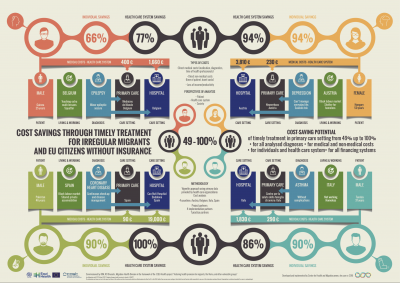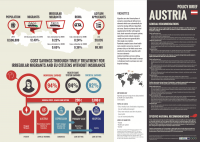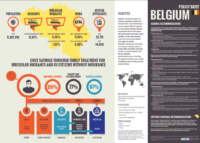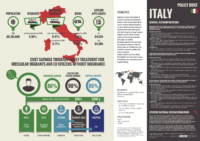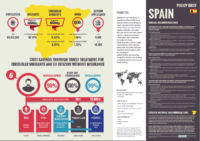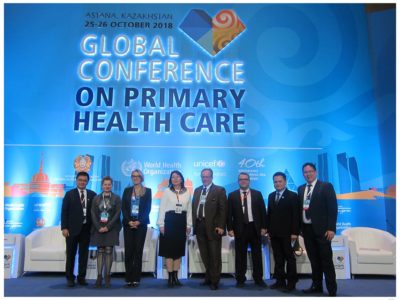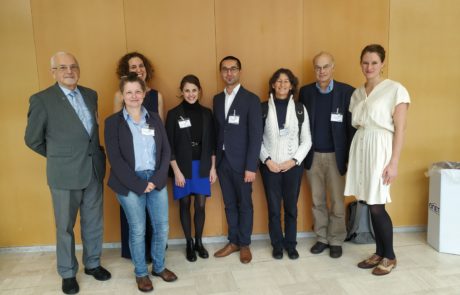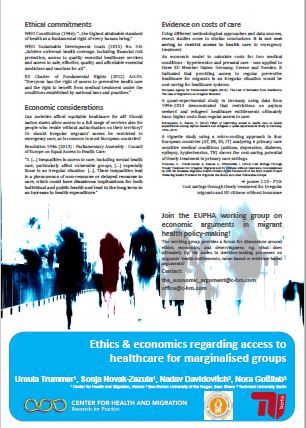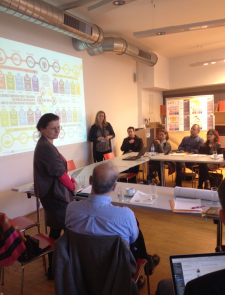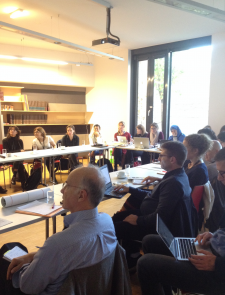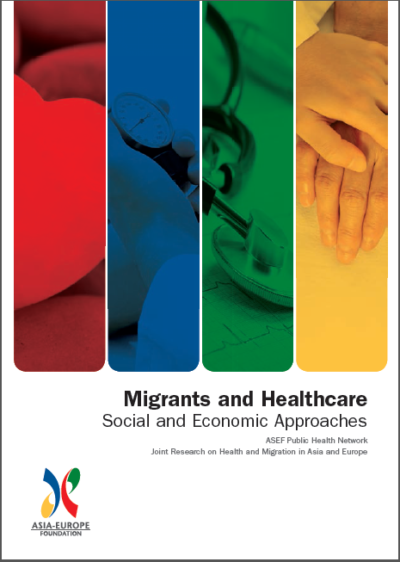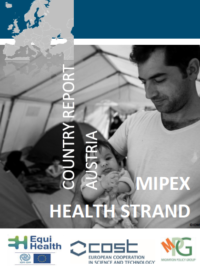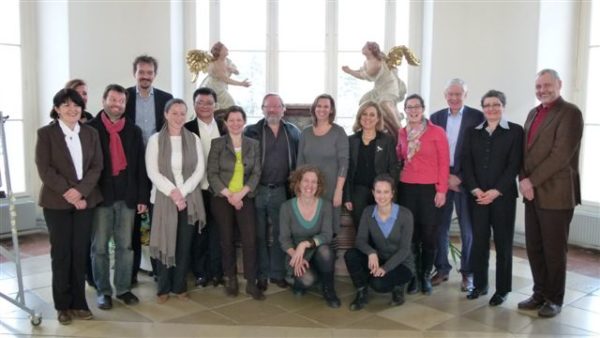Ethics and economics in migrant health
Cost savings through timely treatment for
irregular migrants and EU citizens without insurance
Commissioned by the Migration Health Division of IOM’s Regional Office in Brussels (IOM MHD RO Brussels), the CHM designed and conducted the study in 2014-2017, in close cooperation with IOM and primary health care and hospital service providers in four European Union Member States : Austria, Belgium, Italy, and Spain. The thematic study, undertaken within the framework of IOM’s EQUI-HEALTH project “Fostering health provision for migrants, the Roma, and other vulnerable groups”, analysed economic costs related to the exclusion of irregular migrants from access to the mainstream health care system.
2nd Global Consultation on Migrant Health
In the framework of the 2nd Global Consultation on Migrant Health jointly Organized by IOM, WHO and the Government of the Democratic Socialist Republic of Sri Lanka in Colombo, Sri Lanka from 21-23 February 2017, the cost-benefit argument was elaborated by Ursula Trummer, CHM (Austria), who gave the results of the “Cost analysis of health-care provision for migrants and ethnic minorities” study, conducted in collaboration with IOM and four European Union (EU) member states using hypothetical cases, primary data, register data, desk research and expert opinion.
Global Conference on Primary Health Care
IOM’s Migration Health Division Director Jacqueline Weekers opened the experts’ forum Primary Health Care for Migrants – the Economic Argument, presenting cutting-edge research on experiences both in Europe and Asia on the cost of excluding migrants and asylum seekers from healthcare; organised as side-event at the Global Conference on Primary Health Care held in Astana, Kazakhstan, 25-26 October 2018. The panel discussion was co-chaired by Santino Severoni, Public Health and Migration Coordinator at the World Health Organization Regional Office for Europe and Lyazat Aktaeva, Vice Minister of Health of the Republic of Kazakhstan. Both key note speakers – Ursula Trummer, Head of the Center for Health and Migration and Kai Hong Phua, Professor at the Lee Kuan Yew School of Public Policy – emphasized that the human rights discourse on migrants’ health must be complemented with an economic optimization model.
Ethics & economics regarding access to healthcare for marginalised groups
Presentations:
Louise Biddle Louise: The potential of economic evaluation studies to improve health screening and assessment policies for asylum seekers in Germany
Sol Juarez: Effects of non-health-targeted policies on migrant health
Ursula Trummer, Nora Gottlieb: Ethics, economics and migration: intersections, synergies and tensions
Bringing economics, health and migration together: a mutual learning experiment
Workshop organised by the Work group ‚Economic arguments in migrant health policy making‘
at the 12th European Public Health Conference „Building bridges for solidarity and public health“
Marseille, France – 20-23 November 2019
Acknowledging the role of economic arguments in political discourses and decision-making, researchers have begun to pay more attention to the fiscal implications of different health policy options for migrants. As yet, empirical evidence on economic effects of policy responses to migration and the societal costs or cost-effectiveness of competing strategies to address migrants’ health needs is scarce. Methodological challenges such as limited availability and accessibility of decent data often impede the generation of robust evidence. Further, little is known as to how evidence can effectively be moved into policy; e.g., the actual clout of economic arguments in migration policies debates, as opposed to other evidence- or value-based arguments, hitherto remains unclear.
In other social policy domains such as educational and labour market integration, economic evaluations have become routine components of policy assessments. And under the title of, e.g ., knowledge translation, strategies for the introduction of research evidence into political decision-making processes have been developed. The combination of similar goals and challenges suggests that there are opportunities to build bridges across sectors and disciplines – e.g., public health, social epidemiology, economics, social policy, data science – as well as across research-practice-divides, for the purposes of mutual learning and the joint improvement of research outcomes.
The goal of this workshop is to start such learning processes by bringing together researchers and professionals from different fields, by sharing existing knowledge, and by jointly exploring the following questions:
– What are the thematic intersections, tensions and synergies between the different disciplines? What are common goals and questions? Which kinds of different knowledge complement each other towards those goals?
– Where are options for mutual learning, methodological t ransfer and/or synthesis? How can they help to overcome current challenges in estimating the costs of divergent migrant health policies?
– What can be learnt from existing knowledge translation strategies as regards the role of research for migrant health policy making?
– What challenges and open questions remain?
Ethical commitments, economic considerations, and evidence on costs of care
The main arguments for improving access to health care for marginalised groups has often been primarily based on public health considerations, human rights claims and ethical principles of equity. However, the respective political debates often focus on economic arguments such as moral hazard, (presumed) related health expenses, and the need to safeguard scarce resources. Acknowledging the role of economic arguments in political discourses and decision-making processes, researchers have begun to pay more attention to the fiscal implications of limiting health coverage for migrant and ethnic minority groups.
The poster provides insights in recent debates concerning access to health care for marginalised groups as asylum seekers, refugees and undocumented migrants.
EUPHA working group on economic arguments in migrant health policy-making!
The working group provides a forum for discussions around ethics, economics, and deservingness; e.g. what does ultimately tip the scales in decision-making processes on migrants‘ health entitlements, value-based or evidence-based arguments?
Join the working group!
Contact:
the_economic_argument@c-hm.com
office@c-hm.com
Migrant health – Economics, Human rights, and Quality of Care.
Preconference Workshop EUPHA 2016 – Vienna – 09.11.2016
Jointly organised by EUPHA Section on Migrant and Ethnic Minority Health and the Center for Health and Migration, Vienna
Presentations:
Oliver Razum, Kayvan Bozorgmehr: Effects of restricting access to health care on health expenditures among asylum seekers and refugees
Ursula Trummer, Sonja Novak-Zezula, Anna-Theresa Renner, Ina Wilczewska: Cost savings through timely treatment for irregular migrants and EU citizens without insurance Cost savings
Roumyana Petrova-Benedict: Re-health and the importance of such monitoring tools to feed debates on economics, quality of care, and human rights Re-Health
Nadav Davidovitch: Between Economic and Deservingness Logics: The Debate over Migrant workers and Asylum Seekers Access to Health Care in the Israeli Context Economic and Deservingness Logics
Migrants and Healthcare: Social and Economic Approaches
With Asia and Europe hosting nearly two third of the world’s total migrant population, migrants’ health is increasing its significance in the discussion on migration policies and country’s economy. Migrants’ access to healthcare has often been based on a human-rights point of view. However, there is a need to evaluate of the benefits of including migrants into the receiving country’s healthcare from an economic point of view as well. ASEF Public Health Network’s research project Migrants and Healthcare: Social and Economic Approaches, provides social and economic analyses of failing to provide migrants with full access to healthcare. This is done by examining case studies in Austria, Italy, Hong Kong SAR and Singapore.
Migrants and Healthcare illustrates both the direct and indirect cost of migrants where they do not or have limited access to healthcare, and compares it to the cost where they have access to healthcare. Acknowledging that globalised labour markets demand a healthy and productive workforce, the publication aims to enrich the discussion on health policies by providing evidences to support the argument that the exclusion from primary healthcare causes unnecessary loss of human capital due to delayed or denied treatment.
Health strand of the Migrant Integration Policy Index (MIPEX)
In 2015, MIPEX included a new health strand. It rates if health systems of 38 countries are responsive to immigrants’ needs.
CHM was engaged in the development of policy indicators for the health strand in the framework of the COST ADAPT network and conducted the data collection for the Austrian MIPEX health strand country report.
COST action IS0603 HOME
2007 – 2011
The Cost action Health and social care for migrants and ethnic minorities in Europe brought together some 130 experts from 30 countries to study disadvantages in accessing good health care faced by migrants and ethnic minorities – and what can be done to tackle them.
CHM was Austrian partner in the action with a focus on undocumented migrants and on migrant friendly health care organisations.
COST action IS1103 ADAPT
2011 – 2016
The COST action Adapting European health systems to diversity took the work of COST HOME forward, identifying obstacles to translating existing knowledge into action as well as ‚levers for change‘.
CHM was Austrian partner in the action with a focus on undocumented migrants, Roma, and development of health care organisations towards diversity sensitivity.
Achieving change in organisations
In the framework of COST ADAPT, CHM organised a meeting in Vienna from 15-16 March 2013 which focused on the question of how to get organisations to change. 23 experts from 12 countries discussed how to get the leadership of an organisation to adopt „diversity-proof“ policies and how to get the policies implemented on the workfloor.


